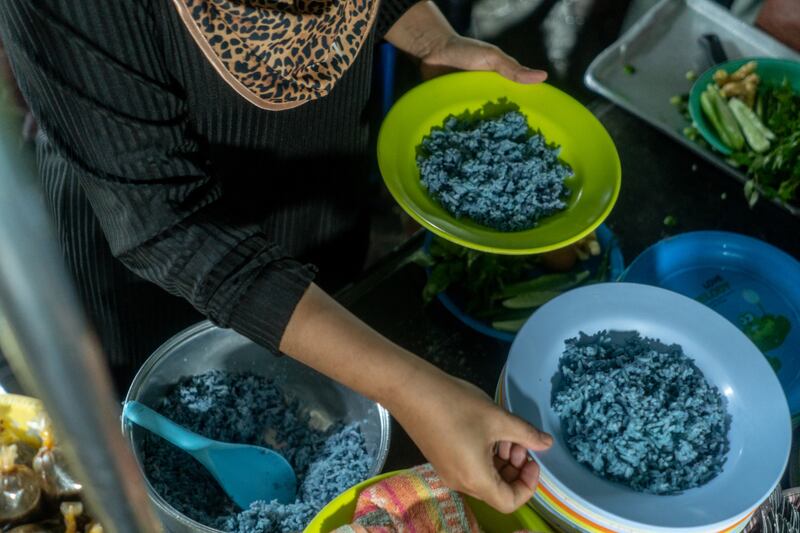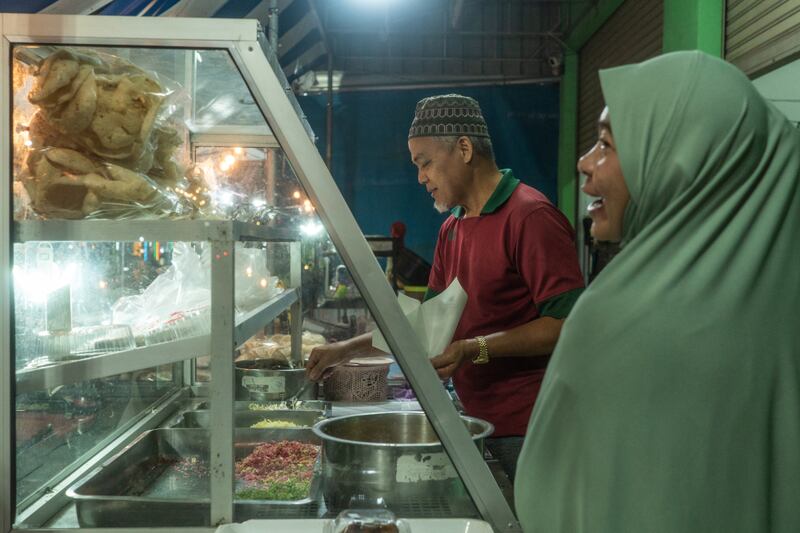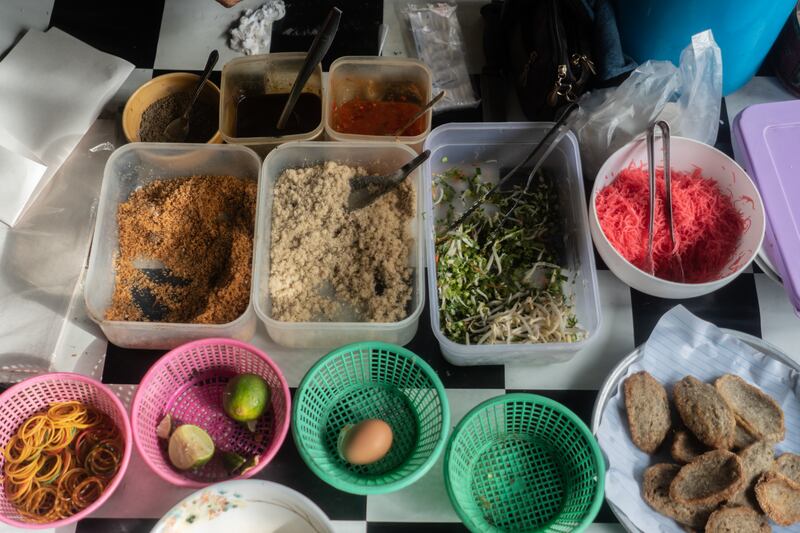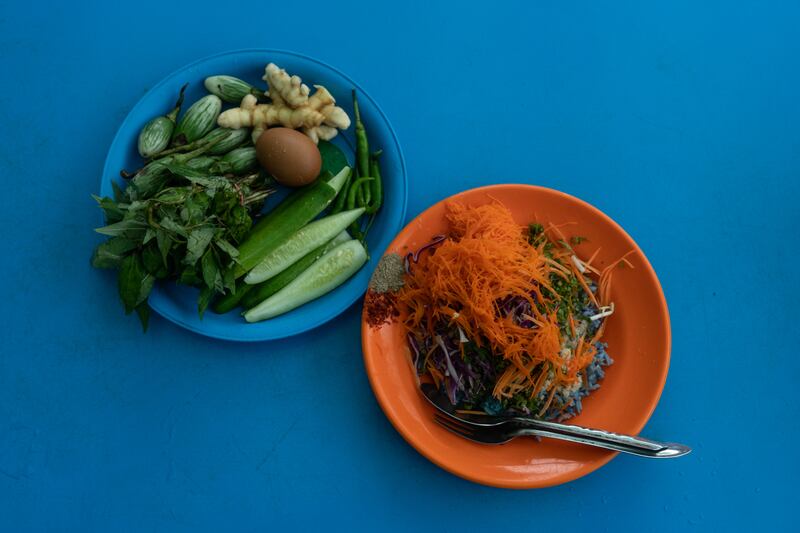For the past two decades, Pattani food vendor Abdulloh Yusoh has been perfecting his signature dish nasi kerabu, earning local acclaim and using its profits to support his three daughters’ education.
Abdulloh, 60, has won four consecutive Local Food Identity Awards in Yaring, a district of Pattni province, underscoring his expertise in this Deep South specialty.
“Deliciousness is subjective, but for us, we simply make the best nasi kerabu we know how to make – just like we eat it ourselves,” Abdulloh told BenarNews.
Nasi kerabu – known as khao yam in Thai – is a salad dish of blue rice (infused with butterfly pea flower to give it that color) mixed with roasted fish, toasted coconut, fermented fish sauce (budu), fresh herbs and vegetables.
It has long been a staple in Thailand’s predominantly Malay Muslim southern border region. The dish has roots in a protracted war in the area back in the 1700s. It’s also closely tied to the local Melayu (Malay) culture in the Thai Deep South, where an ongoing separatist insurgency has simmered for decades.
“Nasi kerabu is as iconic to the Deep South as som tam (papaya salad) is to the northeastern region or khao soi (coconut curry noodle soup) to the north. It reflects the shared culinary identity of the region,” Abdulloh told BenarNews.

Nasi kerabu originated as a humble meal in the border region but has spread geographically over time. The dish, commonly served for breakfast or dinner in the Deep South and parts of Malaysia, is especially popular during Ramadan.
It can be found elsewhere in Thailand. In Bangkok, a Michelin three-star restaurant serves up a reimagined version to diners lucky enough to get reservations.
RELATED STORIES
[ Café culture brews change in Thailand’s far southOpens in new window ]
[ Thai southern border region is struggling, residents tell new govtOpens in new window ]
[ In Thailand’s Deep South, farmers fight to restore vanishing paddy fieldsOpens in new window ]
[ Muslim women in Thai Deep South step into roles at Pattani fish marketOpens in new window ]
Born on the battlefield
The term “nasi kerabu” comes from the Malay words “nasi” (rice) and “kerabu” (salad). Its origins date to the early 18th century, during a protracted war between the Patani Kingdom and Songkhla, then under Ayutthaya rule.
Running low on supplies, Patani soldiers mixed rice with budu and dried coconut to provide sustenance during a time of scarcity. The conflict was later dubbed the “Nasi kerabu rebellion,” according to the Hikayat Patani (Patani Chronicle), which documents the Patani Kingdom’s history.
“Regardless of its historical roots, today nasi kerabu belongs to everyone in the south – Melayu (Malays), Muslims and Buddhists alike. Its ingredients reflect the cultural diversity of the region,” Rukchart Suwan, a Buddhist peace advocate in Yala, told BenarNews.
He said the dish represents more than a meal, it’s a symbol of the Deep South’s shared heritage.

The cost of nasi kerabu varies, depending on where it’s served.
Some eateries serve it with grilled beef, chicken or fish, accompanied by fresh herbs – prices range from 10 baht (U.S. 30 cents) at street stalls to over 70 baht ($2) at mid-range restaurants.
“I’ve eaten nasi kerabu since I was a child, back when it was just 10 baht per plate at local stalls. Now, you can find places that serve fancy versions with premium toppings. If it weren’t so pricey, I’d eat the grilled fish version every day,” Pattani laborer Ammar Doloh, 28, told BenarNews.
Despite rising costs, Abdulloh and other vendors remain committed to quality. His 15 baht (40 cent) nasi kerabu packs are made with locally sourced ingredients.
"Our sauce is infused with herbs. We buy fish from Pattani pier and clean it. The coconut and vegetables come from local farmers. Costs have gone up, but Islam teaches us not to reject small profits," Abdulloh said. "We stay honest with our customers because even if they don't know, God does."
Healthy meal
Rich in fiber and nutrients, nasi kerabu can appeal to health-conscious diners.
“My doctor recommends nasi kerabu for its balanced nutrients, including noni-infused rice, protein-rich roasted fish and vitamin-packed herbs. Many of my retired friends choose it as their healthy meal,” Wan Aedah Wannawan, 56, told BenarNews.
She often sends portions to her son studying in Bangkok to help him save on food expenses.

Ammar, the Pattani laborer, said it was hard to pinpoint why the dish has so many fans.
“Whether it’s truly popular because it’s healthy or because it’s affordable is hard to say. It’s nutritious, yes, but its low cost also aligns with the budgets of many, like industrial workers. Nasi kerabu with a boiled egg is filling and wallet-friendly,” Ammar said.
‘Sea holds the forest’
Last month, Sorn in Bangkok became Thailand’s first Michelin three-star restaurant. Its version of the dish is called “the sea holds the forest,” has gained fame among food critics and social media influencers alike.
Reservations at Sorn are notoriously difficult to secure. Some diners have to make dozens of calls to secure a table.
Affluent customers are willing to spend thousands of baht to taste the dish as a luxury food even as farmers, fishermen and locals in southern Thailand treat it as a comforting, affordable staple.
“The way wealthy people enjoy nasi kerabu gives it one meaning, while our way of eating it gives it another. It’s not just about taste; it reflects our lived experience within a system of inequality. Perhaps, when we overcome our struggles, we won’t eat nasi kerabu anymore,” Ammar said.

While the dish shines in fine dining, its name recalls the Deep South’s dark history.
In October 2016, Thai authorities detained more than 40 Muslim students and residents near Ramkhamhaeng University for allegedly plotting bomb attacks in Bangkok. Although no explosives were found, officers claimed bomb-making materials were hidden in containers of budu and nasi kerabu ingredients.
“‘The budu bomb case’ (khao yum explosion) isn’t a joke, it exemplifies state abuse, injustice, and cultural misunderstanding, highlighting racial discrimination against Melayu Muslims,” Zahri Chelong, an activist fundraising for those affected by security-related cases in the Deep South, told BenarNews.
Nine Muslim men were convicted and sentenced to four to six years in prison in 2018, while five others were acquitted.
“The profiling of youth in Pattani stems from stereotypes and a lack of understanding of cultural diversity. Questions like ‘are you carrying a bomb?’ perpetuate stigma, turning something as innocuous as budu into a security issue,” Mayu Chena, director of the Civil Society Assembly for Peace, told BenarNews.
